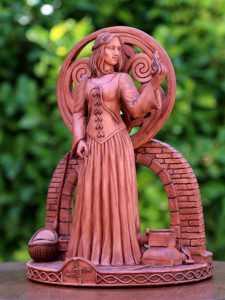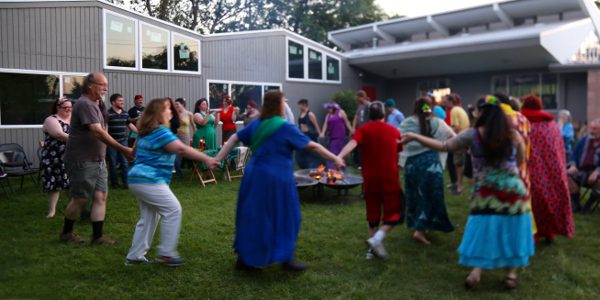I have to admit I have mixed feelings about #mypolytheism. On one hand, its many responses are exploring a wide variety of polytheist beliefs and practices. And it’s giving a voice to those have been reluctant to speak up, and to those who can’t be heard over those of us with louder voices and bigger platforms. These are good things.
On the other hand, it’s all one-way communication. The website makes it very clear that
this is not a space for debate. This is not a space where anyone has to prove anything to you. This is a place to celebrate our diversity in a diverse and amazing world.
Celebrating our diversity is a good thing, and given our multi-cultural, multi-national world, it’s a necessary thing. But as a goal for religion, it’s setting the bar awfully low. What about exploring our highest values and challenging ourselves to live up to them? What about spiritual practices that reinforce those values until they become second nature? What about exploring the nature of life and death and all the other Big Questions of Life? And since this is polytheism, what about experiencing and honoring the Gods? A few of the #mypolytheism responses address these topics – many don’t.
 While these things can be done alone, they’re most effectively done in a community of like-minded people who discuss them, debate their strengths and weaknesses, try them out, see how well they actually work, then go back to the beginning and have more discussions.
While these things can be done alone, they’re most effectively done in a community of like-minded people who discuss them, debate their strengths and weaknesses, try them out, see how well they actually work, then go back to the beginning and have more discussions.
Our bad experiences with fundamentalist proselytizers have led many of us to avoid these deep religious discussions and debates. We don’t want to be “that guy” who obnoxiously pushes his religion on other people. And we’re afraid someone is going to try to force their religion on us. So we avoid religious conversations, and as with much of contemporary Western society, we end up practicing our religion mostly alone.
The word religion comes from the Latin words religare meaning “to bind” and from religio meaning “obligation, bond, and reverence.” Religion is intended to bind people together toward something larger than themselves. When academics discuss the purpose of religion (almost always from a non-theistic standpoint) they talk about things like maintaining group cohesion and encouraging self-sacrifice for the good of the group.
If everyone is practicing their own religion, how can there ever be a group to become cohesive? How can we build a tradition that will live on after we’ve left this world? How can there be a community of solitary practitioners? When will My Polytheism become Our Polytheism?
It won’t. The very nature of #mypolytheism insures it will always be a solitary thing.
But that’s not the end of the matter. The issue is not one of time but one of place. The question should ask where will My Polytheism become Our Polytheism? And the answer is not on the internet, but in our local face-to-face Pagan and polytheist groups.
In a local, face-to-face group, you quickly learn what’s worth fighting over and what isn’t. At Denton CUUPS, there is no creedal test to dance the Maypole. If you’re going to pour an offering to Brighid, no one is going to ask if you’re offering to the Irish Goddess or to the Christian saint or to the ideal of inspiration and smithcraft.
 Sit down after the ritual and there will be some spirited discussion – those of us who have studied a bit of Irish Paganism and who have experienced the Goddess Brighid first-hand will tell you exactly why we believe and do what we believe and do. We’ll listen respectfully to your opinion – present it well and you might convince me to change mine (contrary to what some have suggested, I’m more interested in being right than in appearing to have always been right… and where being right isn’t possible, I want to be as meaningful, helpful, and authentic as I can be).
Sit down after the ritual and there will be some spirited discussion – those of us who have studied a bit of Irish Paganism and who have experienced the Goddess Brighid first-hand will tell you exactly why we believe and do what we believe and do. We’ll listen respectfully to your opinion – present it well and you might convince me to change mine (contrary to what some have suggested, I’m more interested in being right than in appearing to have always been right… and where being right isn’t possible, I want to be as meaningful, helpful, and authentic as I can be).
Online, all we have are discussions. We don’t go camping together or pick up roadside trash together and we don’t have to work together to plan the next public ritual. So there’s nothing to keep us from letting honest religious disagreements turn into taking things personally… or into making them personal.
Face-to-face groups let us see the person on the other end of the conversation, which reminds us that we’re human too, which reminds us that maybe, just maybe, we might be the ones who need to change our practices or our thinking. Local groups provide community to support our deeper explorations and practices, they provide context for our religious experiences, they enable us to support each other in difficult times, and they give us a place to celebrate the good times.
So with all the advantages of group practice, why are we not finding and forming more local polytheist groups? I wrote a piece on this in 2013 and listed five main reasons: there’s nothing near me, I wasn’t welcome, I don’t want the drama, being solitary allows for greater focus, and I’m really an introvert.
That post is as relevant today as it was three years ago. But I’d add that for a large number of Pagans and polytheists, the desire for community is outweighed by the price of community. We don’t want to invest the time and energy into creating and maintaining a group, and we don’t want to make the compromises necessary to get along. I find that frustrating and sad, but while I can preach the benefits of religious community, I can’t change people’s desires. They’re not wrong for wanting what they want.
And that brings us back to #mypolytheism. It is what it is – there are plenty of people who identify as polytheists who just want to practice alone. Some want to explore deeper religious beliefs and practices, but only on their own terms. We need to make room for them in our various polytheist religions and traditions – I’d rather they be in our extended community than in the atheist community or in the spiritual-but-not-religious community.
As others have pointed out repeatedly, polytheism is not a religion. It’s a religious approach or a religious worldview. As the Polytheist Restoration continues, it is reasonable to expect many polytheist religions to arise. I just didn’t expect to see as many religions as there are polytheists.
My calling is to continue to explore the Gods, Their virtues, and Their worship in the greatest depth I can. My calling is to experience Them as intimately as I can. My calling is to help build the best local, face-to-face Pagan and polytheist groups I can. My calling is to write about what I do, to advocate for what I find helpful, and to challenge what I find harmful.
If you’re interested in these things, I hope you’ll join me for the journey – in person if you live nearby, in your own local group if you don’t. Participate in the conversations. Contribute to building community. Figure out where you can agree to disagree and remain in community, and where you have hard limits that can’t be crossed.
If you’re not interested in these things, then I encourage you to practice the polytheism that calls to you, as best you can. Polytheism was never one thing in the past, and it will never be one thing in the future.
As for me, I’m going to keep trying to build Our Polytheism.
















